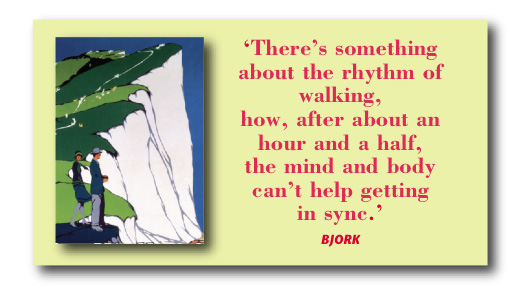Wonderful handbooks
— The Bookseller

The Walker's Anthology - Further Tales
Excerpt:
Introduction
Contents | Introduction | Sample 1: Encounter with a bear, 2007 | Sample 2: The Road Not Taken, 1915 | Sample 3: Preparations for a long walk, 1933 | Sample 4: Travels in West Africa, 1894
‘Solvitur ambulando’, St Augustine said: ‘It is solved by walking’.
Walking is so much more than a means of locomotion, and so much more than a form of physical exercise. Bruce Chatwin writes, ‘My God is the God of Walkers. If you walk hard enough, you probably don’t need any other god.’ For him walking was also a ‘poetic activity that can cure the world of all its ills.’ Indeed, Wordsworth spent much time walking and it is said that when a visitor asked to see his study, his maid explained, ‘Here is his library, but his study is out of doors.’
Philosophers have long agreed that walking is beneficial to thinking. For Jean Jacques Rousseau (see p70) it was crucial: ‘Walking animates and enlivens my spirits; I can hardly think when in a state of inactivity; my body must be exercised to make my judgement active.’
Walking can bring freedom in a small way as an escape from the drudgery of everyday life. Written in 1821, On Going a Journey by William Hazlitt (see p52), is probably the first piece written specifically on the subject of recreational walking. In his words: ‘The soul of a journey is liberty, perfect liberty, to think, feel, do, just as one pleases. We go a journey chiefly to be free of all impediments and of all inconveniences...’ But walking can bring freedom of a much more influential kind when it is in the form of a march or demonstration, such as Gandhi’s Salt March (see p94).
Our legs can take us to the top of the world (see p100 for Edmund Hillary’s account of the last few steps to reach the summit of Everest), or to the ends of the earth – Frank Oates’s account of his travels in southern Africa (see p144), Mary Kingsley’s in West Africa (p138) and Henry Walter Bates’s in Brazil (p125).
Perhaps the best quotation on the subject and importance of walking is that attributed to the Buddha who is said to have given the following advice: ‘Above all do not lose your desire to walk... I have walked myself into my best thoughts and know of no thought so burdensome that one cannot walk away from it.’
Keep walking ... and read on for inspiration.
The Walker's Anthology - Further Tales
Excerpts:
- Contents
- Introduction
- Sample 1: Encounter with a bear, 2007
- Sample 2: The Road Not Taken, 1915
- Sample 3: Preparations for a long walk, 1933
- Sample 4: Travels in West Africa, 1894
Price: £4.99 buy online now…
Latest tweets